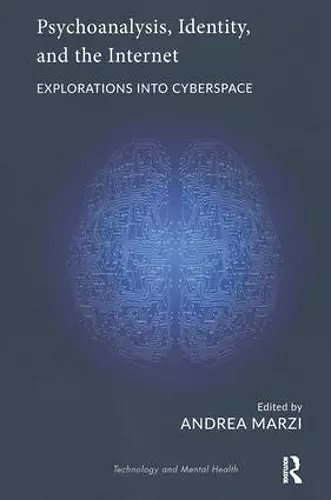Psychoanalysis, Identity, and the Internet
Explorations into Cyberspace
Andrea Marzi author Andrea Marzi editor
Format:Paperback
Publisher:Taylor & Francis Ltd
Published:19th Sep '16
Should be back in stock very soon
This paperback is available in another edition too:
- Hardback£135.00(9780367326296)

Every day we seek information from the internet, buy something, play videogames, chat, work, and so on. But what exactly is the nature of the space we surf in and through? Is it virtual or real? What is the actual relation between the virtual reality we inhabit more or less in a videogame, or a film, or a common experience on the Internet, and the psychic reality that is one of the main focus of psychoanalysis? What happens to the sense of corporeality, time, and space that we are accustomed to, considered as the vital component of subjective experience? And what happens to the real relationships between people?The contributors and the articles presented in the book suggest that the main psychoanalytical theories are the most adequate means to understand the nature of the new subjects that appear in the present world on the Internet and cyberspace era. Not only does psychoanalysis read the multifaceted nature of virtual reality, but cyberspace also affects and influences seminal reflections about psychoanalysis itself and the virtual space of the mind.This timely volume, first published in Italian in 2013, explores the consequences of virtual reality in the analytical field and the peculiar characteristics of the encounter with the particular state of mind of internet-addicted patients; it also shows in detail the path of the therapy, psychotherapeutic or analytic, and the path of the analyst with the net-surfer, a castaway in the realm of virtual reality.Considering all the points of view expressed in the book, cyberspace appears, on the one hand, as a mirror that traps vulnerable people in a pseudo-reality, while on the other hand it appears as a particular dimension which sets creative phantasy free. In either case, this dimension challenges us every day, while spreading out, alluring us, eluding us.
'I think that it would be a failure for psychoanalysis to deny, ignore or avoid the huge change that the internet has brought about in our lives today. This book acknowledges and explores this major topic, opening up a thoughtful and stimulating debate, and I consider this a remarkable contribution for the psychoanalytic community.'-- Stefano Bolognini, training and supervising analyst, and President of the International Psychoanalytical Association'This book is a profound meditation on the virtual complexes of our modern world, allowing a freedom to imagine beyond the narrow discourse of Skype technique and training.'--Dr Jonathan Sklar, training analyst, British Psychoanalytical Society'In this book a number of psychoanalysts respond to the challenge that internet users - their patients - are asking them to take. It is not only about having sessions on Skype, a challenge to the setting, but also about engaging with what their patients follow on the internet, be it pornography, war games, or other material. Solidly anchored in theory, the authors venture into the material, finding through it a golden road to their patients' unconscious phantasy. A timely book.'--Alessandra Cavalli, child and adult analyst'Andrea Marzi's excellent volume provides a much-needed and timely bridge between psychoanalysis and today's internet technology. Psychoanalysts are challenged to consider the impact of these technologies on personality development, psychopathology, interpersonal relationships and clinical practice. Although the internet has great potential for expanded relatedness, it also has deleterious effects, including seriously limiting personal relationships. This book is a must-read for psychoanalysts, and in fact all healthcare professionals and those interested in the interconnection of mind/brain and expanding modes of communications.'--Mary Kay O'Neil, supervising and training analyst, Toronto Institute of Psychoanalysis'Andrea Marzi and his co-authors have taken a daunting subject and made it not only understandable, but also clinically useful, especially for those of us who did not grow up with the concepts of cyberspace, digital technology, and virtual reality. They have ingeniously and courageously shown that these concepts are no different analytically from the technical concepts of earlier ages, such as "the influencing machine", radio waves, and TV transmissions. They make it clear that digital technology, like the earlier ones, can also be used for defensive and narcissistic purposes, to create a virtual world of "imaginary" relationships that are the proper focus of treatment and transference in this "modern" age.'--Robert L. Pyles, Past President of the American Psychoanalytic Association
ISBN: 9781782204312
Dimensions: unknown
Weight: unknown
268 pages